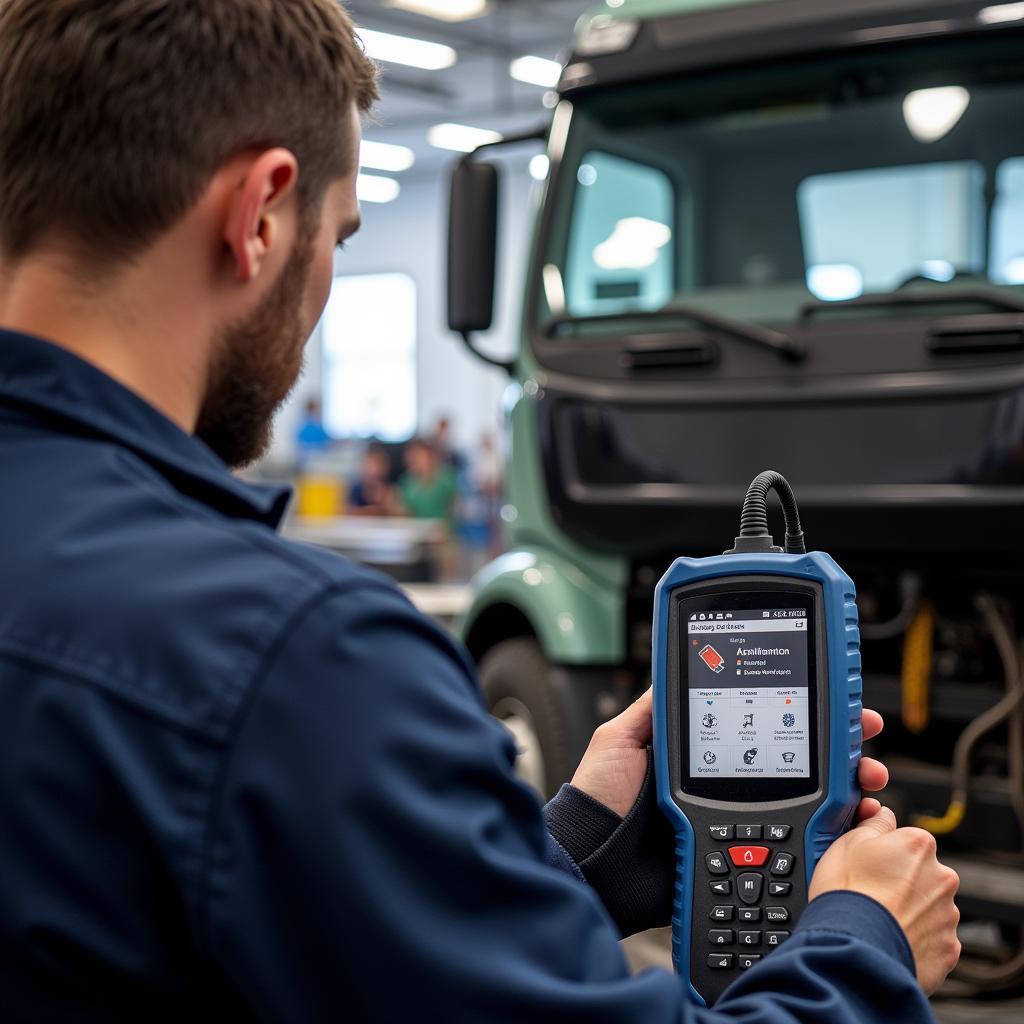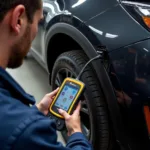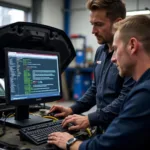Modern vehicles are complex machines reliant on intricate electronic systems. When problems arise, accurately pinpointing the issue is crucial for efficient repairs. This is where car and truck diagnostic tools come in, revolutionizing how mechanics troubleshoot and maintain vehicles. This comprehensive guide delves into the world of car and truck diagnostics, exploring their types, functionalities, benefits, and how they empower both professionals and DIY enthusiasts alike.
What are Car and Truck Diagnostic Tools?
Car and truck diagnostic tools are sophisticated devices designed to interface with a vehicle’s onboard computer system, often referred to as the Electronic Control Unit (ECU). By accessing the ECU, these tools can retrieve and interpret valuable data about the vehicle’s health and performance. This data helps identify malfunctions, diagnose problems, and monitor various systems, including:
- Engine: Ignition timing, fuel injection, emissions, and more.
- Transmission: Gear shifting, fluid pressure, and sensor readings.
- Brakes: ABS system, brake fluid levels, and electronic stability control.
- Airbags: Deployment systems, crash data, and sensor functionality.
Types of Car and Truck Diagnostic Tools
The market offers a wide array of car and truck diagnostic tools, each tailored to different user needs and budgets. They can be broadly categorized as:
1. Code Readers
As the name suggests, code readers are basic diagnostic tools that primarily read and display Diagnostic Trouble Codes (DTCs) stored in the ECU. These codes are alphanumeric identifiers that pinpoint potential problem areas within the vehicle’s systems. While helpful for identifying the general nature of an issue, code readers typically lack the advanced features of higher-end tools.
2. Scan Tools
Scan tools offer a significant step up from basic code readers. In addition to reading and clearing DTCs, they provide access to a broader range of data, including:
- Live Data Stream: Real-time information from various sensors, allowing for dynamic monitoring of vehicle performance.
- Freeze Frame Data: A snapshot of sensor readings at the time a fault code was triggered, providing valuable context for diagnosis.
- Component Activation: The ability to remotely activate certain vehicle components, like solenoids or actuators, to test their functionality.
3. Professional-Grade Diagnostic Scanners
These are the most sophisticated and feature-rich diagnostic tools available, primarily used by professional mechanics and dealerships. They offer the most comprehensive suite of functionalities, including:
- Advanced Coding and Programming: Ability to reprogram or update the vehicle’s ECU with new software or configurations.
- Bi-Directional Controls: Comprehensive control over various vehicle systems for advanced troubleshooting and component testing.
- OEM-Specific Functionalities: Tailored capabilities for specific vehicle makes and models, allowing for deeper diagnostics and specialized repairs.
Benefits of Using Car and Truck Diagnostic Tools
The adoption of car and truck diagnostic tools has revolutionized the automotive repair industry, providing numerous benefits:
- Accurate and Efficient Diagnostics: Quickly and accurately pinpoint vehicle problems, eliminating guesswork and unnecessary repairs.
- Reduced Repair Costs: By identifying the root cause of issues, these tools help minimize unnecessary component replacements and labor costs.
- Improved Vehicle Performance: Regular diagnostics can identify potential problems early on, allowing for timely maintenance and optimal performance.
- Enhanced Safety: Identifying and addressing issues related to brakes, airbags, and other safety-critical systems ensures a safer driving experience.
- DIY Empowerment: Affordable diagnostic tools empower car enthusiasts to perform basic diagnostics and troubleshoot minor issues themselves.
Choosing the Right Diagnostic Tool
Selecting the right car and truck diagnostic tool depends on individual needs and expertise:
- DIY Enthusiasts: Basic code readers or entry-level scan tools offer sufficient capabilities for reading and clearing codes, monitoring basic parameters, and performing simple resets.
- Professional Mechanics: Advanced scan tools or professional-grade diagnostic scanners provide the comprehensive functionality needed for in-depth diagnostics, complex repairs, and advanced programming tasks.
 Mechanic Using Diagnostic Tool on Truck
Mechanic Using Diagnostic Tool on Truck
Future Trends in Car and Truck Diagnostics
The field of car and truck diagnostics is constantly evolving, with technological advancements driving innovation. Key trends shaping the future include:
- Wireless Connectivity: Wi-Fi and Bluetooth enabled tools offer seamless data transfer and remote diagnostics capabilities.
- Cloud-Based Platforms: Cloud storage and analysis of vehicle data provide historical insights and facilitate predictive maintenance.
- Artificial Intelligence (AI): AI-powered diagnostics assist in analyzing complex data patterns, providing faster and more accurate diagnoses.
Conclusion
Car and truck diagnostic tools have become indispensable tools in the automotive industry, empowering mechanics and vehicle owners alike. By providing access to critical vehicle data, these tools facilitate accurate diagnostics, efficient repairs, and improved vehicle performance. Whether you’re a professional mechanic or a DIY enthusiast, understanding the capabilities of these tools can significantly enhance your approach to vehicle maintenance and repair. Remember to choose a diagnostic tool that aligns with your skill level and specific needs to unlock the full potential of these powerful devices.
FAQs
1. Are car and truck diagnostic tools universal?
While most vehicles manufactured after 1996 utilize the standardized OBD-II port, the specific protocols and functionalities supported can vary between makes and models.
2. Can I use a car diagnostic tool on a truck, and vice versa?
Some diagnostic tools are designed for both cars and trucks, while others are specialized for specific vehicle types. Ensure the tool you choose is compatible with your intended application.
3. Do I need a professional to use a car or truck diagnostic tool?
Basic code readers and entry-level scan tools are user-friendly and can be operated by DIY enthusiasts. However, professional-grade tools often require specialized knowledge and training for proper use.
4. How often should I use a car or truck diagnostic tool?
It’s generally recommended to perform a diagnostic scan at least once a year or whenever you experience any unusual vehicle behavior.
5. Can car and truck diagnostic tools fix problems?
Diagnostic tools are primarily for identifying problems. While some tools offer basic reset functionalities, actual repairs typically require mechanical expertise and appropriate tools.
Need Help with Car and Truck Diagnostics?
For expert assistance and guidance, contact our team via WhatsApp at +1(641)206-8880 or email us at [email protected]. We’re available 24/7 to answer your questions and provide comprehensive support. You can also explore our other helpful resources on car and truck diagnostics, Delphi car and truck diagnostic, car and truck diagnostic equipment, car and truck diagnostic tool and car truck diagnostic tool for more in-depth information.

